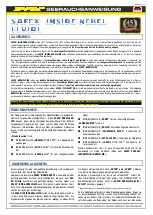
5
Breakdowns and remedies
• To prevent the clogging of this glue gun,
keep feeding mechanism and melt chamber
free from dirt and other foreign debris.
• Store unused glue sticks in a clean
environment.
• Do not pull glue stick from the back of the glue
gun. The feed mechanism may be damaged or
impaired. If you need to change glue type, cut off the
protruding end and feed the remainder through with
the new glue stick.
• Do not lay the heated gun on its side. Keep the
heated gun in an upright position, on the metal
stand or workbench, with nozzle pointed down.
• If melted glue has escaped from the melt chamber
entrance and is interfering with the feed mechanism;
allow gun to cool, and gently remove the obstructing
glue.
• Replace the nozzle if glue drips excessively. Do not
attempt to change the nozzle when glue is cold. To
change the nozzle, the gun must be heated until the
glue is softened enough to remove the nozzle (about
1 minute). Use gloves and remove the old nozzle.
Flush glue through the gun, to clean out the melting
chamber. Replace with a new nozzle. Tighten only
until snug. Do not over tighten.
• Keep outside of glue gun clean.
• Do not use glues other than those recommended by
Rapid
• Leaving the tool switched on for too long without
use can lead to risks. Unnecessary overheating over
a long period of inactivity, without use, depending on
the length of time and type of glue used, can have
adverse effects:
* Melting and softening of the glue stick at the
back of the tool, or even adhesion of the stick
in the back entrance sleeve at the entrance of
the heater. In this case, restarting your tool for
subsequent operation may take longer and be
more difficult.
In the event of such a problem, Rapid
recommends that you follow these steps:
- Plug in the tool and leave it heating for around
fifteen minutes.
- Start to push the glue by pressing lightly on
the trigger from time to time. Continue to
let the tool warm up and repeat this action
until it unblocks. The unblocking time may be
longer or shorter depending on: The type and
composition of the glue that would have been
used and the duration for which the tool has
been left heating up unnecessarily, without
being used for gluing.
If start-up is still difficult after this action:
- Remove the nozzle, beware with the device
being hot.
- Place the tool on its stand. Leave it plugged in
and heated.
- Purge the tool by letting the hot glue flow
out under gravity, onto a disposable support
(container, paper, cardboard,..).
- Start to push the glue by pressing lightly on
the trigger from time to time. Continue to let
the tool warm up and repeat this action until it
unblocks. Pull the trigger a few times, to make
sure that the old glue has been completely
cleared and the tool has been completely
purged.
* Charring of the glue, depending on the nature
and composition of the glue used, occurs
when the glue remains molten, trapped inside
the tool, for too long. Once charred, the glue
will begin to obstruct the nozzle and thus lead
to a glue leakage of glue towards the back of
the tool which in the long-term can be serious
consequences such as a system blockage at the
front or a break in the heating system.
In this event:
- Remove the nozzle, beware with the device
being hot.
- Place the tool on its stand. Leave it plugged in
and heated. Purge the tool by letting the hot
glue flow out under gravity, onto a disposable
support (container, paper, cardboard,..).
- Insert a new glue stick, pushing lightly on the
trigger.
- Pull the trigger a few times, to make sure that
the old glue has been completely cleared and
the tool has been completely purged.
- Replace the nozzle with a new one.
• In any case, you should never:
- Force the trigger before the tool has heated up to
its working temperature
- Push hard on the glue stick, never attempt to
remove it from the back.
• Repair work on the glue gun should be carried out
by qualified staff only.
• If the power supply cable is damaged it must be
replaced by the manufacturer, the manufacturer’s
after sales service or a similarly qualified person in
order to avoid any danger.
Summary of Contents for EG340
Page 2: ......
Page 27: ...27 12mm Rapid EVA 230 C 3 5 120 220 C 1...
Page 28: ...28 Rapid Rapid 2 Esselte Rapid ON OFF AC 220 240V 220W...
Page 32: ...32 230 C 3 5 120 220 1 Rapid Rapid...
Page 33: ...33 2 Esselte 1 2 RAPID AC 220 240V 220W...
Page 42: ...42 1 Rapid Rapid e...
Page 43: ...43 2 The Esselte Rapid 1 2 RAPID ON OFF AC 220 240V 220W...
Page 44: ...EG340 Operating Instructions Isaberg Rapid AB Box 115 SE 330 27 HESTRA SWEDEN www rapid com...






































